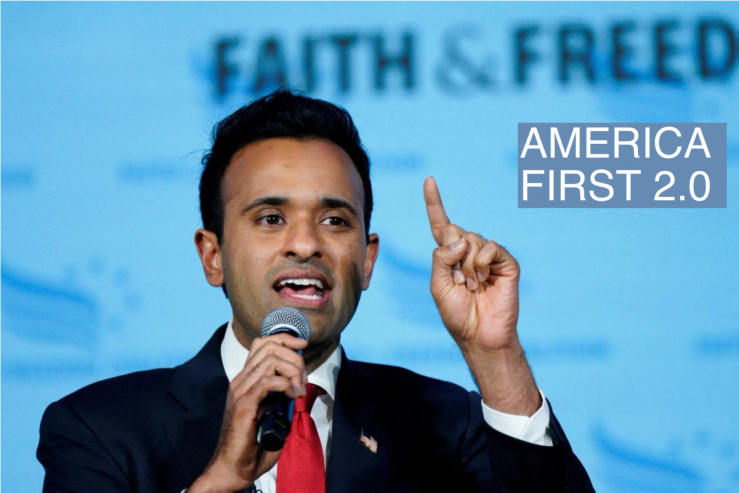The News
Vivek Ramaswamy has the confidence and energy of a true believer. Over the weekend he criss-crossed Iowa on an intense multi-day bus tour that featured early mornings, late nights, hours of shaking hands, play time with his young children, and some tennis. He seems to have a perpetual bounce in his step.
What’s the belief that has him so excited? That there is a world beyond Donald Trump, one that painstakingly takes the lessons he’s taught the right and distills them into a clear formula to pass on to the generation that comes next.
“I am in this race to take the America First agenda further than Donald Trump ever did, because I will do it based on first principles and moral authority — not based on vengeance and grievance,” the 37-year-old Indian American businessman said during one of his Saturday events.
All of which raises a basic question for the party: Do Republicans truly want the changes wrought by Trump turned into a code to live by? Or do they just want the man himself, who is currently leading early primary polls by a wide margin?
In this article:
Shelby’s view
I spent a few days with Ramaswamy and his team in Iowa, joining him at events, on his bus, and a 6 A.M. tennis drill group that included me and Eric Branstad, an Iowa Republican bigwig who has been involved in multiple Trump campaigns and invited the 2024 candidate to the session. (Ramaswamy is somewhat of a tennis fanatic, and while he didn’t play in college, he’s a high-level recreational player — when he manages to find the time to play).
One clear takeaway is that his team is just as invested in his ideas as he seems to be. He’s surrounded by people (a team of roughly 50 that includes a videographer of sorts helping document the process) who genuinely believe in his message, and good old fashioned hard work seems to make up the backbone of their strategies.
Ramaswamy, with Fox News often muted on three of the TVs inside the bus, went into depth on his pitch to American voters during some of our discussions. He described Trump as the “OG” (original gangster) when it came to the movement, but maintained that the former president failed “to have the fuel to actually take it the distance.”
“Yes, the other side has it in for him, but I will never make it as easy for the other side to stifle me in going that distance,” he said. “When you’re doing it based on principles, unapologetically based on moral footing, It’s very hard to come after. I think he makes it easy for them.”
There have been years of political discussions about whether Republicans can create “Trumpism without Trump.” Ramaswamy doesn’t view his project that way — he prefers the term “America First” (or “America First 2.0”), telling Semafor that “Trumpism” is simply “about Trump” while his former movement is focused on “putting American interests first.”
To Ramaswamy, the core principle is “American identity” — the idea there’s a national character that transcends both the public and private sector and that should crowd out more divisive discussions about individual identity groups.
This view was epitomized in his recent on-air debate with Don Lemon — which, possibly related, ended with Lemon fired shortly after — in which an exasperated Lemon told the candidate that “whatever ethnicity” he was, it was up to Black Americans to decide the degree to which racism still informs their lives. Not so, Ramaswamy countered: “I’m an Indian American, I’m proud of it, but I think we should have this debate: Black, white doesn’t matter.”
“Trump got a lot of good things done but never made the argument to the American people of why that was tied to American identity,” he told me. “He said America advanced certain policies, but he didn’t connect that to why it had to do with the founding principles that set the country into motion.”
Ramaswamy highlighted some of the ways in which Trump failed to go far enough: He didn’t end affirmative action — which he said Trump’s own team told him at the time that wasn’t “a political hill we wanted to die on” — he didn’t use the U.S. military to secure the Southern border (Ramaswamy wants to launch offensive operations on cartels), and he talked big on reforming the administrative state without accomplishing much (Ramaswamy says he’ll “gut it” entirely).
“He went as far as he was gonna go. I’ve got fresh legs. I’m not compromised, and that’s why I won’t compromise,” he said.
There’s an immigrant-family optimism to Ramaswamy’s version, too, one that emphasizes the ability of hardworking Americans to find success and bolster that national identity in doing so. But there’s still also Trump’s tendency to pick a minority group that’s seen as infringing on that identity and attack: In Ramaswamy’s case, he’s been perhaps the most aggressive candidate in describing transgender people as mentally ill and at times tying that to violence.
In Ramaswamy’s eyes, his age also factors into the argument that he can take the “America First” movement to the next level. (He always mentions in his speeches that he’s the first ever millennial Republican presidential candidate). There’s also perhaps an implicit critique of Trumps’ many decades of personal baggage, an ongoing source of distractions that has left voters with extremely rigid views about him.
“At a certain point, you take the torch as far as you can, you pass it on to the next guy, let him go the distance,” he said.
At the same time, he is reluctant to criticize Trump too hard directly. This is by design. As a campaign memo released Wednesday put it: “The mistake every other campaign is making is that they see their path to the nomination through Trump, when our path is alongside Trump.”
Not so with Ron DeSantis, who Ramaswamy described to me as “a joke” and “a copycat,” who “doesn’t like human beings.”
“He’s just floating out stuff that he thinks is most likely to trend back positive,” he said. “I think people can tell the difference between a follower and a leader.”
But DeSantis also has something Ramaswamy does not: Name recognition — a subject that was commonly discussed by his staffers throughout the weekend, and one they clearly hope to fix in part by making him as available to press as humanly possible.
The good news for Ramaswamy is that he currently sits in a three-way tie for fourth in Morning Consult’s GOP primary election tracker alongside bigger names. The bad news is he’s at 3%, barely outside the margin of error. And it’s still unclear whether there’s a place for the movement if Trump isn’t leading the charge.
There are signs the media blitz and always-on-the-ground strategy is working, at least to some extent, however. Throughout the weekend’s many events, there were multiple times where a voter began a question to Ramaswamy by noting that they’d seen him on Fox News or CNN. And after hearing him speak, many potential voters told me they were interested in his message and genuinely considered him as an option for their vote.
“I think the message really landed – people are hungry for it,” Ramaswamy, leaning back in one of the reclining, movie-theater type seats as his bus drove back to the hotel, told me one night. “The biggest obstacle is going to be people who would otherwise vote for me, but making sure they don’t feel like they’re cheating on their man.”
Room for Disagreement
In the National Review, Charles C.W. Cooke argues that Ramaswamy’s “decision to download and internalize all of the cheapest 2021-era MAGA-at-the-bar mood affiliations gives him the air of a smarmy, opportunistic automaton.” What he’s really doing in this presidential run, Cooke add, is “building a ginormous mailing list” and “running as” Trump’s “press secretary.”
Notable
Steven Mufson wrote in The Washington Post that while Ramaswamy is considered a “presidential long-shot,” he’s actually been consistently influencing “the rhetoric of the GOP contest.”


